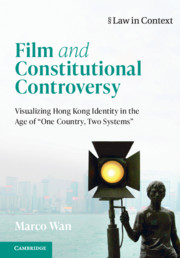 Film and Constitutional Controversy
Film and Constitutional Controversy Tammy Cheung’s July
Published online by Cambridge University Press: 05 February 2021
In the summer of 2003, around 500,000 people marched on the streets in Hong Kong in protest against the government’s attempt to introduce legislation relating to national security under Article 23 of the Basic Law. As many commentators observed at the time, the protest was also a process of identity formation: Since the demonstration presented itself as a fight to protect the city from the intrusion of repressive Chinese legal norms, it created a bond among the protestors and their supporters and fostered a sense of what it means to be a “Hong Konger.” Tammy Cheung, an independent documentary filmmaker, attempted to capture the event on film, and the result was July (2004; 七月). Her challenge was to make a cinematic record that only presents the factual unfolding of the protest, but communicates the sensation of being in the midst of its charged atmosphere and enables viewers to share the sense of community that it created. I explore what it might mean to create a record of this constitutional controversy through an analysis of the themes, structures, and cinematography of Cheung’s film.
To save this book to your Kindle, first ensure no-reply@cambridge.org is added to your Approved Personal Document E-mail List under your Personal Document Settings on the Manage Your Content and Devices page of your Amazon account. Then enter the ‘name’ part of your Kindle email address below. Find out more about saving to your Kindle.
Note you can select to save to either the @free.kindle.com or @kindle.com variations. ‘@free.kindle.com’ emails are free but can only be saved to your device when it is connected to wi-fi. ‘@kindle.com’ emails can be delivered even when you are not connected to wi-fi, but note that service fees apply.
Find out more about the Kindle Personal Document Service.
To save content items to your account, please confirm that you agree to abide by our usage policies. If this is the first time you use this feature, you will be asked to authorise Cambridge Core to connect with your account. Find out more about saving content to Dropbox.
To save content items to your account, please confirm that you agree to abide by our usage policies. If this is the first time you use this feature, you will be asked to authorise Cambridge Core to connect with your account. Find out more about saving content to Google Drive.